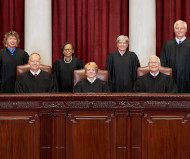Article from: www.thenewspaper.com/news/66/6672.asp
3/14/2019
Minnesota Supremes Limit Car Confiscation From Innocent Owners
Minnesota Supreme Court imposes minor restriction on the ability of police to seize cars by requiring prompt hearings for innocent owners.
 To save the Minnesota law that authorizes police to confiscate cars from drunk driving suspects, the state Supreme Court on Wednesday declared that police could not take cars from innocent owners any longer. That was what happened to the white 1999 Lexus RX300 SUV, which was seized by the Shakopee police on October 7, 2015, because its driver, Megan Olson, was pulled over under the suspicion that she had been driving under the influence of alcohol (DUI), something that had happened on three previous occasions.
To save the Minnesota law that authorizes police to confiscate cars from drunk driving suspects, the state Supreme Court on Wednesday declared that police could not take cars from innocent owners any longer. That was what happened to the white 1999 Lexus RX300 SUV, which was seized by the Shakopee police on October 7, 2015, because its driver, Megan Olson, was pulled over under the suspicion that she had been driving under the influence of alcohol (DUI), something that had happened on three previous occasions.
The SUV did not belong to Megan Olson. It belonged to her mom, Helen Olson, and the state law authorizing the seizure gave the elder Olson no realistic way to contest the taking until her daughter's criminal trial was complete.
While the statute contains an "innocent owner" defense, another clause states that this defense cannot be exercised if the driver happens to be a family member with three prior convictions. The Olsons moved to have the law struck down in its entirety as a clear violation of due process rights. They argued the law took property from owners who were not accused of any crime without offering an opportunity to challenge the taking until DUI trial was complete, which in this case was February 13, 2017 -- eighteen months after the police grabbed the Lexus.
A district court agreed the law was unconstitutional, but the Court of Appeals said the law was constitutional, just not in this particular case. In its ruling Wednesday, the Supreme Court followed the appellate panel's reasoning.
"Generally, due process requires that an individual receive notice and an opportunity to be heard before the government takes her property," Justice Paul Thissen wrote for the divided court. "Accordingly, it is possible that the criminal proceedings underlying a driving while intoxicated forfeiture case could be resolved with sufficient speed to satisfy due process."
The high court also noted that the law as a whole should stand because providing actual due process would be too expensive in a state where law enforcement grabbed 3596 cars in 2017.
"If courts were required to hold a prompt hearing shortly after a vehicle is seized in every single case of DWI forfeiture, it would add substantially to the cost and administrative burden of courts and prosecutors" Justice Paul Thissen wrote.
In this particular case, however, the long delay between the seizure and the hearing troubled the court and opened the door to a compromise. They suggested limiting the hearings to special cases like that of the Olsons.
"Helen cannot recoup the loss of the economic value of the vehicle during the 18 months of seizure even if she is eventually deemed an innocent owner," Justice Thissen wrote. "Because government seizure of a vehicle owned by one individual and driven by another individual is a subset of all designated DWI seizures, requiring a prompt hearing in innocent-owner cases poses less of a burden on courts and prosecutors. Further, the scope of such a hearing could be restricted to considering only the innocent-owner defense (and perhaps related hardship arguments by the non-offender claimant)."
The justices brushed aside the claim from the state that due process was satisfied by a provision in the seizure law that gives a prosecutor discretion to release a vehicle.
"Informal proceedings and vague standards are not favored in the law; they are breeding grounds for potential abuse," Justice Paul Thissen wrote.
The high court ordered the Lexus, which has been in an impound lot for three years, returned to Helen Olson without any fees charged, ending the matter for good. The court saw no purpose at this point in forcing her to attend a hearing and prove she was an innocent owner.
A copy of the ruling is available in a 400k PDF file at the source link below.
Source: Olson v. One 1999 Lexus (Minnesota Supreme Court, 3/13/2019)
Permanent Link for this item
Return to Front Page
 To save the Minnesota law that authorizes police to confiscate cars from drunk driving suspects, the state Supreme Court on Wednesday declared that police could not take cars from innocent owners any longer. That was what happened to the white 1999 Lexus RX300 SUV, which was seized by the Shakopee police on October 7, 2015, because its driver, Megan Olson, was pulled over under the suspicion that she had been driving under the influence of alcohol (DUI), something that had happened on three previous occasions.
To save the Minnesota law that authorizes police to confiscate cars from drunk driving suspects, the state Supreme Court on Wednesday declared that police could not take cars from innocent owners any longer. That was what happened to the white 1999 Lexus RX300 SUV, which was seized by the Shakopee police on October 7, 2015, because its driver, Megan Olson, was pulled over under the suspicion that she had been driving under the influence of alcohol (DUI), something that had happened on three previous occasions.